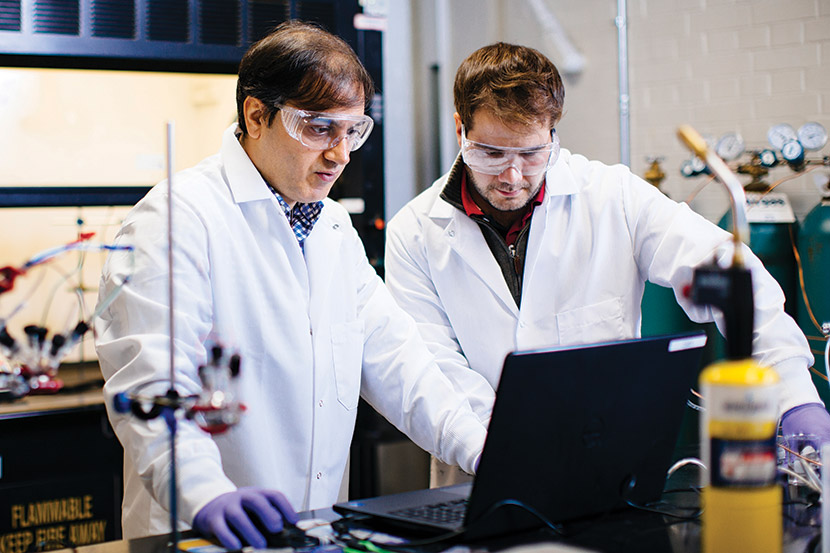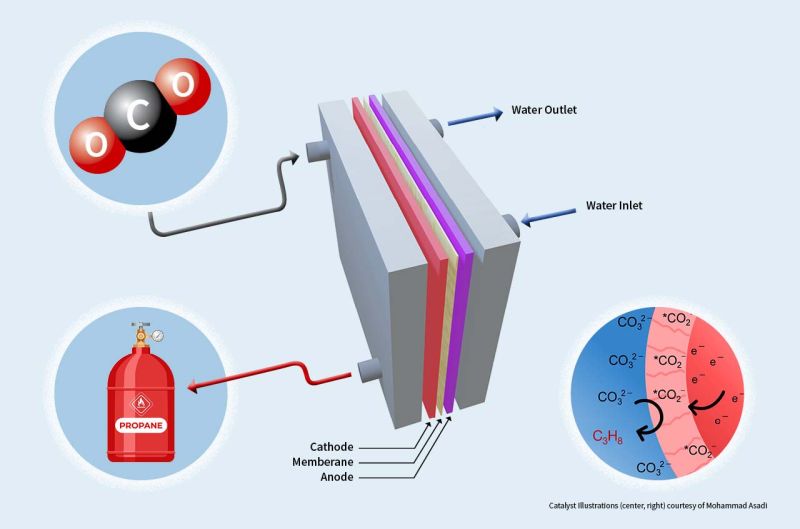Throughout its history, our department has been recognized as one of the premier research institutions in the nation. Currently, 14 faculty members and a number of research professors actively lead research groups in various areas of chemical and biological engineering.
The interests of the faculty are diverse and cover processes at scales spanning from the atomic level to the global environment. Their research activities can be generally classified in one or more of four strategic research focus areas.
Chemical and Biological Engineering Research Areas
The Department of Chemical and Biological Engineering (CHBE) has long been recognized, nationally and internationally, for the expertise of its faculty in particle technology, fluidization, and transport and interfacial phenomena. Research activities in these areas occur through a number of research centers: the Center of Excellence in Polymer Science and Engineering, Center for Electrochemical Science and Engineering, and Particle Technology and Crystallization Center.
In recent years, our department faculty have embarked on research in emerging areas, such as nanomaterials, complex fluids, nanofluids, molecular modeling, novel catalysts, and membranes for fuel cells and batteries.
Examples of the research interests of individual faculty in advanced materials include:
Sohail Murad
Expertise: Molecular modeling of complex materials for selective water, ion, and gas transport with applications to separations
Victor Perez-Luna
Expertise: Surface chemistry, nanomaterials, biomaterials, and biosensors
Jay Schieber
Expertise: Molecular and multi-scale modeling of complex fluids, transport phenomena in polymers
Darsh T. Wasan
Expertise: Foams, emulsions and nanoparticle suspensions; wetting, spreading and adhesion of nanofluids
Our biological engineering research activities cover broad topics in both biochemical and biomedical engineering research. Areas include biomaterials, biosensors, tissue engineering, bioinformatics, molecular modeling of proteins, diabetes, bio-derived energy, bioremediation, and fermentation, among others.
Faculty research interests include:
Ali Cinar
Expertise: Agent-based modeling of angiogenesis, modeling and control of glucose in patients with diabetes
Sohail Murad
Expertise: Molecular modeling of complex materials for selective water, ion and gas transport with applications to separations
Satish Parulekar
Expertise: Biochemical engineering, recombinant protein production, microbial inactivation in foods by high-pressure and microwave processing
Victor Perez-Luna
Expertise: Biomaterials, biosensors, and hydrogels for biomedical applications
Jay Schieber
Expertise: Multi-scale modeling of biomimetic materials, macromolecular dynamics
Fouad Teymour
Expertise: Medical applications of hydrogels, biofuels, and enzyme kinetics
Energy-related research has always been an area of traditional strength at Illinois Tech, mostly through the activities of the Wanger Institute for Sustainable Energy Research, the Center for Electrochemical Science and Engineering, and our renewable energy initiatives.
Our department activities include research programs in fuel cells, batteries, renewable energy, gas cleaning, hydrogen storage, and water management. We are also a leader in the “house of the future” project, which is intended to provide Illinois Tech students and researchers with a living laboratory for the testing of novel energy and sustainability technologies.
Faculty research in the area of energy and sustainability include:
Javad Abbassian
Expertise: Coal gasification, high temperature gas cleaning
Hamid Arastoopour
Expertise: Computational fluid dynamics of multi-phase systems, nanoparticle fluidization
Donald Chmielewski
Expertise: Design and control of fuel cell and alternative energy systems
Dimitri Gidaspow
Expertise: Hydrodynamics of multiphase flow, computational fluidization, coal gasification, fuel cells
Satish Parulekar
Expertise: Modeling of fuel cells, electrodeposition
Jai Prakash
Expertise: Electrochemical characterization and synthesis of novel materials for batteries and fuel cells
The Department of Chemical and Biological Engineering has had a longstanding tradition of excellence in research in process modeling, monitoring, and control; process system integration; complex systems; system theory; and nonlinear dynamics. Recent activities include the use of hierarchical networks of intelligent autonomous agents for monitoring, diagnosis, and control of distributed and networked systems.
Faculty research interests in the area of systems engineering include:
Javad Abbasian
Expertise: Conceptual process design
Donald Chmielewski
Expertise: Model predictive controller tuning, process optimization, sensor network design
Ali Cinar
Expertise: Modeling, analysis, and control of complex distributed systems; process supervision
Satish J. Parulekar
Expertise: Chemical reaction engineering, reactions with separations, modeling and optimization of biological and chemical processes
Fouad Teymour
Expertise: Complex system analysis, polymer reaction engineering




